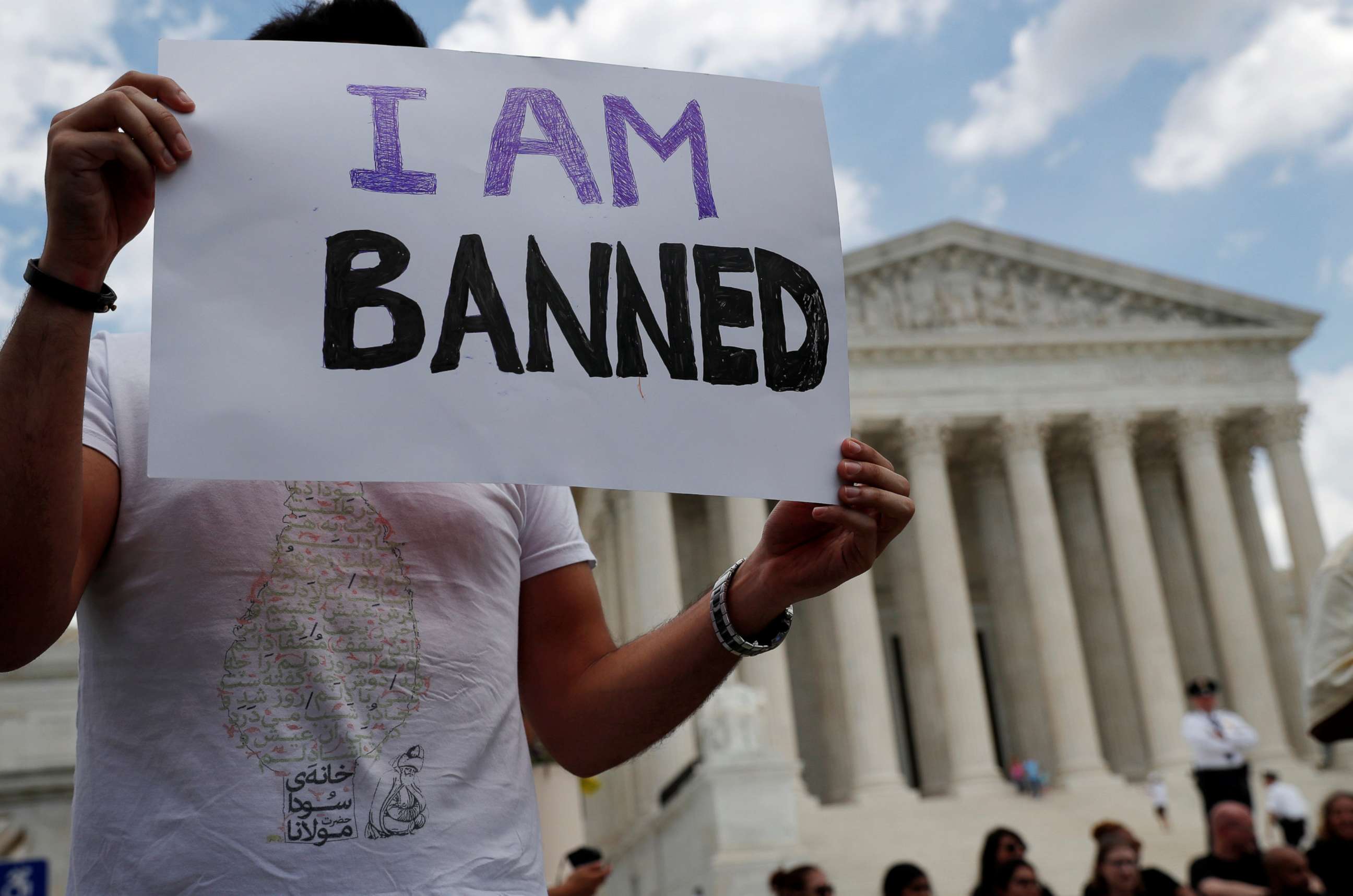US less than halfway to 'upper limit' of refugee cap as record numbers seek help
Immigration hardliners have praised Trump for all but eliminating the program.
The U.S. is "slow-walking" the admissions process for refugees, according to national security experts and refugee advocacy groups, and the numbers appear to back that up.
At the halfway point of the U.S. government's fiscal year, President Donald Trump's administration has admitted fewer than half of the total number of refugees it said it would, already the lowest cap in the refugee program's history.
National security experts and refugee advocacy groups warn that the administration is still slow-walking the admissions process, which damages American credibility and leadership abroad.
But immigration hardliners have praised Trump for all but eliminating the program.
According to a review of the latest publicly available data, the U.S. has taken in 12,099 refugees since Oct. 1. That's fewer than half of the 30,000 cap the administration committed to last fall, even at a time of historically high levels of refugees and displaced persons.
At the current pace, the U.S. would admit around 25,000 by fiscal year's end, actually an increase from last year's processing of 22,491 refugees, the second-lowest sum in the program's nearly 45-year history.
But it pales in comparison to the average figure under previous administrations, both Republican and Democrat, which averaged 78,865. And while previous presidents of both parties largely met admission targets, a State Department spokesperson told ABC News the Trump administration is no longer committed to doing so.
"This number is not a target, but an upper limit," said the spokesperson, who spoke on condition of anonymity because it is department policy.
The spokesperson also downplayed the halfway point as a poor representation of whether the administration will reach 30,000, saying that admissions "rarely proceed at a steady pace throughout the year. It is premature to predict the number of refugees who will ultimately be admitted."
Globally, the number of refugees and displaced persons remained at historic highs in 2018. There were 68.5 million displaced people, including 25.4 million refugees, according to the latest data available from the United Nations.
Some countries hit hardest by the violence and turmoil, forcing people to flee, are among those from which the U.S. has admitted the fewest refugees. Since Oct. 1, the U.S. has admitted 218 Syrian refugees, 216 Afghans and 168 Iraqis, including nine Yezidis who are persecuted for their identity.
After his presidential campaign advocated for barring all refugees, Trump initially did so for 90 days in his first travel ban executive order that also blocked visas from seven Muslim majority-countries. After legal battles, a version of the temporary refugee ban was allowed to take effect, and once it expired, the administration announced extended restrictions on the very countries from which the majority of refugees come.
Now, those restrictions are no longer in place, but all refugees undergo additional background processes that advocates have said are unnecessary and designed to waste time.
"They have added additional bureaucracy. ... There's been a lot of unnecessary bureaucratic delays," said Jenny Yang, vice president of advocacy and policy at World Relief, a Christian humanitarian organization that helps resettle refugees in the U.S. "At a time when the administration could be leading the world in our humanitarian response, which has traditionally been a bipartisan effort, they are slow-walking the program."

That has international implications, some experts warn, as other countries mimic the U.S. and admit fewer refugees. Globally, refugee admissions are down 50%, per World Relief, and U.S. partners including Lebanon have been increasingly advocating for their refugee populations to return home.
But for many, including Syrians, Afghans, and the Rohingya refugees fleeing ethnic cleansing in Myanmar, ongoing conflicts in their home countries prevent a safe and voluntary return.
As these vulnerable populations live for years in refugee camps, national security experts warn, they become more susceptible to radicalization, and any strain put on host countries to sustain them can become spark violent backlash or destabilize regions.
The Trump administration has been accused of working to dismantle the U.S. refugee admissions program, first by setting increasingly lower caps but more recently by proposing in its fiscal 2020 budget to strip the State Department's Bureau of Population, Refugees and Migration, or PRM, of certain funds and authorities.
"America's stellar record in dealing with refugee and other displacement issues has for many decades depended on the fusion of the State Department's diplomatic and humanitarian arms, with PRM playing a key role," said Gene Dewey, who served as George W. Bush's assistant secretary for population, refugees and migration. "This bad proposal would sacrifice this winning combination for no good reason."
Dewey was one of more than 50 former U.S. foreign policy officials who signed a letter to Congress urging it to block the move, as well as the budget proposal's cuts to humanitarian aid. The State Department has said the changes are "to try to replace outdated, fragmented structures," as Eric Ueland, Director of the Office of U.S. Foreign Assistance, said.
The Assistant Secretary for PRM position has been vacant for the entirety of the Trump administration. Last May, the White House nominated Dr. Ronald Mortensen for the role, which drew fierce criticism because of his hard-line views on immigration and disparaging comments about immigrants and Republicans who've voted for immigration reform.




